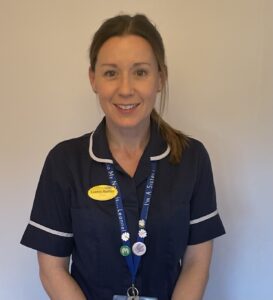A day in the life of a Clinical Nurse Specialist
By Leanne Radford, Head & Neck CNS at Torbay and South Devon NHS Trust
 As a Head & Neck Clinical Nurse Specialist (CNS) based at Torbay and South Devon NHS Foundation Trust for the last two years, my professional journey has spanned 19 years, primarily within surgical wards. A significant portion of my career was dedicated to being a Sister on a Head & Neck and Maxillofacial surgical ward, where I gained extensive expertise in caring for patients undergoing Head and Neck surgery.
As a Head & Neck Clinical Nurse Specialist (CNS) based at Torbay and South Devon NHS Foundation Trust for the last two years, my professional journey has spanned 19 years, primarily within surgical wards. A significant portion of my career was dedicated to being a Sister on a Head & Neck and Maxillofacial surgical ward, where I gained extensive expertise in caring for patients undergoing Head and Neck surgery.
The role of a Head & Neck CNS is inherently complex, yet extremely fulfilling, allowing me to engage with patients and their families during what is often one of the most challenging periods of their lives, which is both an honour and privilege. While I cannot eradicate their cancer diagnosis, I have the opportunity to enhance their cancer journey and improve their overall quality of life.
My responsibilities are multifaceted and diverse, reflecting the comprehensive nature of care required for Head & Neck cancer patients, from diagnosis through various treatments, including surgery and oncological therapies such as radiotherapy, chemotherapy, and immunotherapy. I am deeply involved in every step of the patient’s journey and my engagement extends beyond medical interventions to encompass holistic support, emotional guidance, and educational empowerment.
Central to my role is active participation in multidisciplinary team meetings, where collaborative decision-making ensures comprehensive and individualised care plans tailored to each patient’s unique needs. Pre-treatment education sessions offer patients and their family’s valuable insights into what to expect during treatment, helping to alleviate anxiety and empower them to actively participate in their care journey.
Following treatment, the post-treatment clinics provide a vital platform for ongoing monitoring, assessment, and support. Through holistic needs assessments, we identify and address any physical, emotional, or practical concerns, ensuring a seamless transition from active treatment to survivorship. Additionally, our specialised tracheostomy/laryngectomy clinics offer essential care and support to patients navigating the challenges associated with these procedures and we have a specific tracheotomy/laryngectomy clinic for speech valve monitoring and changes, as well as perform routine tracheostomy tube changes. Added to this we provide and deliver laryngectomy and tracheostomy training to our ward staff, biannually, and are always available to support the ward with our airway patients.
Head & Neck cancer presents a multitude of challenges, both for patients and healthcare professionals. As a CNS, I play a pivotal role in guiding patients through the complexities of their treatment journey, offering support, compassionate care, and expert guidance every step of the way. I provide patients with detailed information in relation to their care and treatment, supporting both the patient and their families, encouraging them to call with any concerns, which are addressed and escalated appropriately when necessary. Timely and early intervention is vital for our patients and aids with avoiding emergency admissions. Our support helps the patients to navigate the all too often confusing health system, we are available to arrange appointments, and have answers to a range of queries from treatment side effects to financial benefits; signposting externally when required.
My experience with Oral Mucositis
Many of my patients require radiotherapy as part of their treatment, which can cause a wide range of adverse side effects, including fatigue, pain, skin breakdown, swallowing difficulties, and oral mucositis.
Oral mucositis is a significant and common side effect that we observe causing severe pain and discomfort, impacting the patient’s ability to swallow. It is characterised by painful inflammation and ulceration of the mucous membranes lining the mouth, which can significantly affect a patient’s quality of life, nutrition, and ability to continue with cancer treatment. In severe cases, we see patients requiring a hospital admission to manage their pain and nutritional needs, and the impact of oral mucositis on a patient’s well being is also profound.
Early detection and active intervention are crucial in ensuring improved experience and outcomes for patients. We review our patients weekly whilst they are undergoing radiotherapy treatment, using guidelines following the WHO (World Health Organisation) oral mucositis classification toxicity scale to assess the severity of mucositis.
At our Trust, we have embraced innovative approaches to enhance patient care and improve outcomes. One such initiative is the introduction of GelX oral spray to alleviate pain and discomfort associated with oral mucositis, a common side effect of radiotherapy treatment. All our patients are prescribed GelX oral spray to be started from day 1 of their treatment, as a preventative measure; it provides a protective barrier over the oral mucosa, and helps to alleviate pain and discomfort, which results in improved oral hygiene and increased nutritional intake. This intervention has also produced promising results, with improved patient compliance, reduced opioid use, and overall enhancement in oral mucositis severity, contributing to a more positive cancer journey for our patients.
In conclusion, the role of a Head & Neck CNS is dynamic, challenging, and deeply rewarding. Through our continued commitment to excellence in patient care, collaboration with multidisciplinary teams, and dedication to innovation, I strive to make a meaningful difference in the lives of those affected by the disease. As I continue to navigate the complexities of cancer care, my focus will continue to remain committed to providing compassionate, comprehensive, and patient-centred care to all of my patients.
